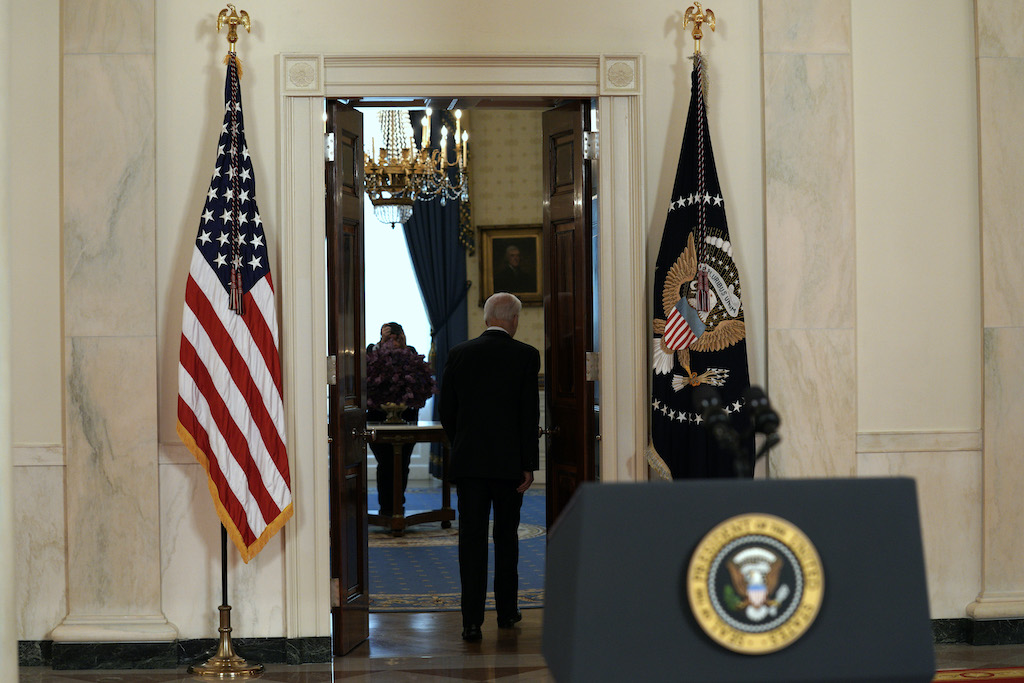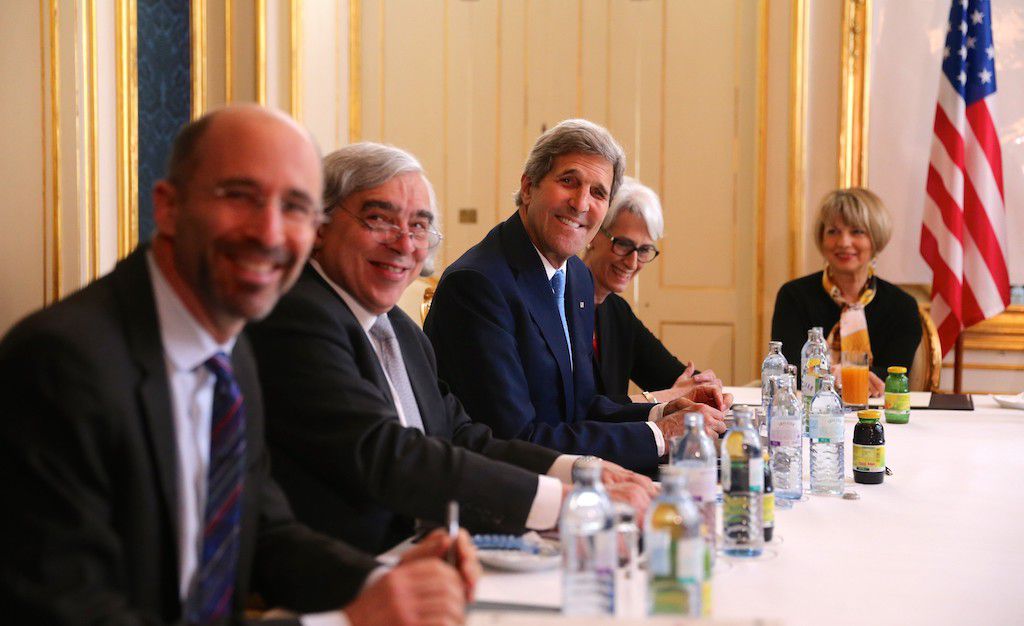Biden and the Abraham Accords: Attempt to disengage
The united front against Iran is crumbling. Joe Biden prefers to restore the nuclear deal with Iran over advancing the promising realignment process spurred in the region by the Abraham Accords.

In a nutshell
- President Biden finds it hard to disengage from the Middle East
- His efforts to re-engage with Iran comes with costs
- Current policies may undo Abraham Accords gains
With the Biden administration passing the hundred-day milestone, the new president’s goals are becoming more apparent. Faced with urgent domestic problems and geostrategic challenges from China and Russia, the new U.S. leader is not keyed to the Middle East.
In the region, Mr. Biden wants a speedy return to the 2015 nuclear deal with Iran (the Joint Comprehensive Plan of Action, or JCPOA) so his administration can focus on the threats perceived as most relevant to the U.S. Also, there will be a greater involvement on environmental issues such as pollution and global warming. However, the recent crisis with Hamas and the tension it aroused demonstrated that it is not easy to disengage from the Middle East.
Successful accords
Mr. Biden’s predecessor Donald Trump had made a thoroughgoing effort to prevent a nuclear Iran, withdrawing from the JCPOA and imposing stringent sanctions. At the same time, the Trump administration promoted peace in the Middle East with the Abraham Accords and its ‘‘Deal of the century’’ blueprint to solve the Palestinian issue. Mr. Trump believed that bringing stability and development to that troubled region and stopping Iran’s ayatollahs from acquiring nuclear capability was in America’s best interests.
Iran has entered into a strategic agreement with China to show that it has other options.
As a result, relations between Israel and its new Gulf allies progressed at a genuinely incredible pace. Ambassadors were appointed and embassies hurriedly set up, and trade was taking off. That progress led Morocco and Sudan to join in the peace process. America’s influence in the Middle East, which had been waning during the Obama presidency, was ascending. President Biden’s new approach threatens to undo much of that progress. Determined to achieve a speedy resolution of the Iranian crisis, the administration sidelined the Abraham Accords.
Its attempts to find a suitable compromise are not being reciprocated so far. On the contrary, Tehran keeps on violating the JCPOA. Its Houthi proxies in Yemen are intensifying their attacks on Saudi Arabia, and pro-Iranian militias in Iraq are launching missiles at U.S. army bases in the country. Tehran says it will not budge until all sanctions have been lifted. Its envoys even refuse to sit down with American representatives at the negotiation table in Vienna. Great Britain, France and Germany need to act as the messengers between the two. Also, Iran has entered into a strategic agreement with China to show that it has other options should Washington refuse to cancel sanctions or insist on adding further limitations to the 2015 agreement.
Can they improve the JCPOA?
During the election campaign, candidate Biden and his team declared their intent to seek a more comprehensive and longer-term agreement with Tehran, addressing critical issues missing in the original deal. These are expected to include such safeguards as preventing Iran’s development of long-range ballistic missiles with nuclear warheads and ending its subversive activities in the broader region.
Upon taking office, President Biden made his good intentions known to the Iranians. Furthermore, he appointed to the State Department’s Iranian desk three key Obama-era people who had conducted the negotiations that led to the 2015 agreement: Robert Malley, who now heads the desk and is the U.S. envoy to Iran; Wendy Sherman, who is second in command at the State Department; and William Burns, head of the Central Intelligence Agency (CIA).

They will probably try hard to restore a deal they had been heavily invested in making. Tellingly, the president wasted no time canceling the former administration’s decision to list Ansar el Sharia – the Houthi militia in Yemen repeatedly targeting Saudi oil infrastructures – as a terror organization. This move was followed by apparently greenlighting South Korea’s decision to free $1 billion out of the $7 billion that it owed Iran for oil deliveries; money had been frozen because of the Trump sanctions. That happened after Iran had released a Korean tanker seized in the straits of Hormuz three months earlier. The decision was announced on April 11, 2021, during the South Korean prime minister’s visit in Tehran – coincidentally, the day the five signatories to the JCPOA informed they were reinitiating contacts with Iran and the U.S. to persuade the latter to return to the deal.
In another much-telling development, the White House announced that it would reconsider the sale of F-35 fighter planes to the United Emirates. President Trump used that deal to encourage Abu Dhabi to conclude a full peace treaty with Israel and strengthen the Gulf’s anti-Iranian front.
Riyadh did try to pacify Washington by freeing prominent human rights activists and some prisoners.
The Biden administration also said it was suspending the arms sales contracts worth $730 million to Saudi Arabia, America’s key partner in the Gulf. The deal had been signed during the previous administration as a testimony to the partners’ strategic alliance. Now, President Biden expressed his intention to review all aspects of this relationship.
Allies’ concern
Are the bonds fraying? One wonders. Saudi Arabia remains a strong ally in the fight against terror and a major player in the field of energy. Since the historic 1945 meeting between President Franklin D. Roosevelt and King Abdullah bin Abdulaziz, Saudi Arabia pledged to supply oil to America, which, in turn, would guarantee the kingdom’s safety. President Biden says the U.S. upholds the alliance, but new factors need to be considered, such as human rights, the Khashoggi affair, and the war in Yemen. On February 5, 2021, he went further, ending U.S. support for the five-year-long, Saudi-led offensive in Yemen. The president described it as a ‘‘humanitarian and strategic catastrophe’’ and declared that it ‘‘has to end.’’
Yet barely two days later, the Biden administration warned Yemen’s Houthi rebels against ongoing attacks against civilians and declared that the U.S. would help the kingdom ramp up its defenses against outside attacks as part of the two countries’ security alliance. Riyadh did try to pacify Washington by freeing prominent human rights activists and some prisoners holding both Saudi and American citizenship. Nevertheless, Saudi Arabia feels that America’s support is slipping and has begun looking for a modus vivendi with Iran, its bitter enemy that now appears to have the upper hand.
Era of uncertainty
Witness the Houthis, who, far from being deterred by the U.S. administration’s warnings, are intensifying their attacks at the behest of Iran. Tehran supplies them with modern military equipment and drones that deliver strikes at the heart of the kingdom. It is hard to see how Saudi Arabia could reconcile with the ayatollahs who want to topple the monarchy and turn the domain into a Shiite fiefdom.
This new American policy has already hobbled the expansion of the Abraham Accords. Saudi Arabia’s Crown Prince Mohammed bin Salman, who considered joining the peace process with Israel, did not take the plunge. His father, King Salman, has opposed such a move as long as the Palestinian issue remains unresolved. Another critical factor, however, had been the Saudis’ concern that Donald Trump would not be reelected, and that a Democratic administration would not be as friendly toward the kingdom.
The president also declared reinstating American aid to the Palestinian Authority.
There remains vital security cooperation between Saudi Arabia and Israel, and economic ties are still growing. Moreover, it is widely rumored that Indonesia, the most populous Islamic country in the world, may be on the verge of signing an agreement with Israel, a step that could encourage other countries to do likewise. However, barely a week after President Biden took office, the administration announced that the State Department would take another look at the Abraham Accords, thus ushering in a new era of uncertainty.
Limited change
Reversing the policy of his predecessor, the new president also declared that he would reinstate American aid to the Palestinian Authority – despite the Congress-approved Taylor Force Act. (The legislation bans allocating funds to the Palestinian government as long as it supports terror and financially rewards terrorists and their families.) President Biden already renewed U.S. contributions to The United Nations Relief and Works Agency for Palestine Refugees in the Near East (UNWRA) stopped by his predecessor because of the organization’s textbook anti-Semitism. In addition, the PLO representation in Washington would be allowed to reopen, and so would the American consulate in East Jerusalem dealing with Palestinians.
On April 14, 2021, on the eve of Israel’s 73rd Independence Day, Secretary of State Antony Blinken did declare in a recorded statement that “[t]he United States welcomes and supports the recent normalization agreements. We will continue to urge more countries to normalize relations with Israel.” However, acts speak louder than words. President Biden has been effectively erasing President Trump’s legacy while restoring the myth that the Palestinian issue must be solved first. Still, the administration has not gone back on recognizing Jerusalem as the capital of Israel and is not considering transferring the U.S. embassy back to Tel Aviv.
Iran, meanwhile, is changing the situation on the ground. It is now in possession of 2,000 kilograms of uranium enriched at 20 percent instead of 200 kilograms enriched at 3.76 percent, as stipulated in the JCPOA. It has installed some new centrifuges after the explosion at its Natanz site and, apparently, started producing 60-percent enriched uranium, for which there is no civilian use. Iranian delegates are spreading rumors that the Geneva negotiations are progressing well, and that 70 percent of the issues have already been solved – a view seemingly not shared by the U.S. delegation, which talks of difficulties and a lengthy process.
Israel, directly threatened by the country that officially aims to destroy what its ayatollahs call ‘‘the Zionist entity,’’ is not standing idle. It closely follows developments on Iranian nuclear sites and is implicated in a series of mysterious explosions that have delayed uranium enrichment in those sites for a lengthy period. Israel also frequently targets pro-Iranian militias in Syria, destroying convoys of Iranian arms en route to Lebanon and Hezbollah’s military storage facilities.
Scenarios
Jerusalem wants Washington to understand that it will do everything within its powers to prevent Iran from acquiring a nuclear capability. High-ranking Israeli delegates recently visited Washington for talks with their counterparts; President Biden granted an hour-long interview to Mossad head Yossi Cohen, but apparently, he refused to be swayed. Israel’s envoys must have at least hinted that even though they do not want to go against U.S. policies, they would act should Iran get dangerously close to having the bomb. The Israelis probably did not disclose the form this reaction would take. In the past, military options had been mentioned.
The united front against Iran built by the Gulf states with Israel with the backing from the Trump administration is now crumbling. However, the Abraham Accords are far from dead. On the contrary, the process continues to transform, albeit slowly, the Middle East. Egypt Air, the country’s national carrier, is about to start flights to Tel Aviv after four decades of peace between the two countries. The Emirati airline already offers daily flights, and Bahrain airlines is joining in, perhaps the first step toward the kingdom’s warmer relations with the Jewish state.
Nevertheless, the region faces an uncertain future as the new U.S. administration gropes for direction in the Middle East and weighs its policy options. It seems that Hamas, banking on the strong support of the more extreme wing of the Democrats in Washington and frustrated by the cancellation of Palestinian legislative elections it expected to win, concluded that the time was ripe for a new confrontation with Israel. The administration’s reaction was hesitant and confused. While approving 735 million dollars of arms sales to Israel, President Biden called on the “two sides” to show restraint; then he affirmed that Israel “had the right” to defend itself. However, he was unable to withstand the mounting pressure from the extreme left of the Democratic party. As Hamas kept firing missiles indiscriminately at civilian towns and villages, the president finally pressured Israel to accept an immediate cease-fire.
Peace efforts in the region have been set back. The coalition of Iran, Hezbollah, Islamic Jihad, Hamas and the Muslim Brotherhood feels that it has the upper hand. Yet, Israel’s new Gulf allies, though being put in an embarrassing situation, so far made do paying lip service to the plight of the Palestinians and did not sever ties. Neither did Jordan, despite inflammatory rhetoric coming from that country. As to Egypt, it did all it could to defuse the situation.
It may take a while longer, but barring the unforeseen, President Biden is likely to reach a compromise with Tehran and rejoin the JCPOA. Will the deal include the necessary safeguards? Washington should perhaps reflect on the May 2010 warning issued by Iranian News Agency IRNA: "There is no lion in the region save the one crouching on the shore opposite the Emirates states. … He protects his lair, the Persian Gulf. Those who believe that there is another lion in the area [the United States], his claws and fangs have been broken in Iraq, Afghanistan, Lebanon and Palestine".








